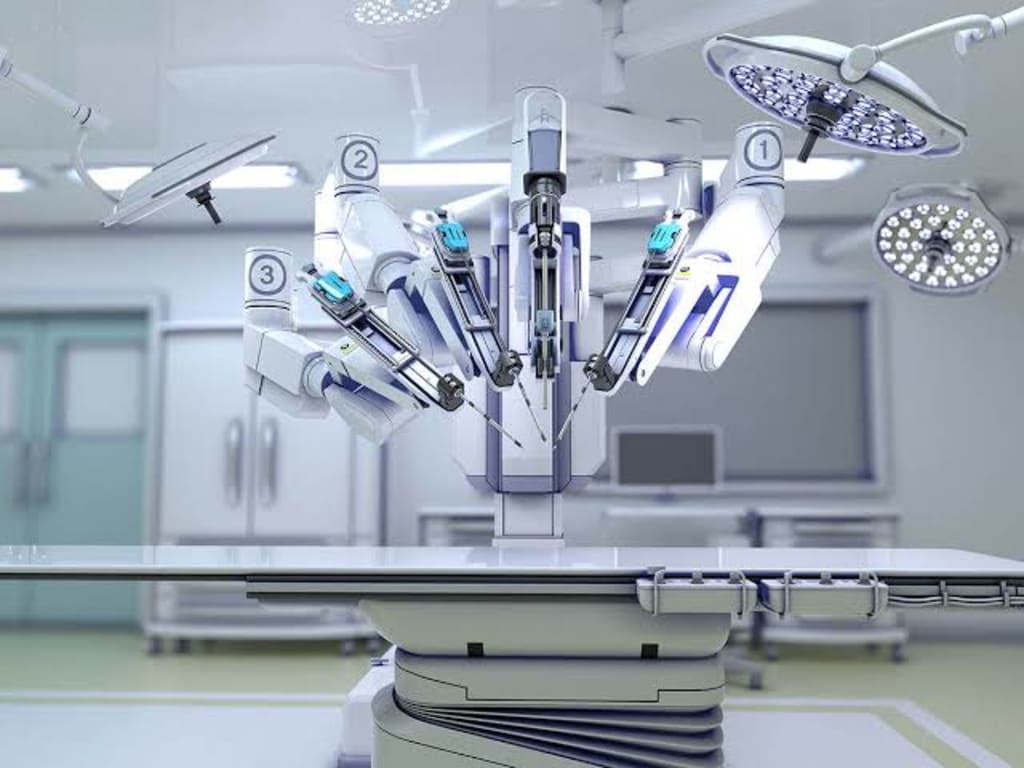Robotics in Healthcare: Enhancing Patient Care and Surgical Procedures
Advancing Patient Care and Surgical Procedures through Robotics in Healthcare

Introduction
The field of healthcare has witnessed a remarkable transformation with the introduction of robotics, revolutionizing patient care and surgical procedures. With advancements in robotics and artificial intelligence, healthcare providers can harness the power of robotic systems to enhance precision, improve outcomes, and explore new possibilities in diagnosing, treating, and aiding the recovery of patients. This article delves into the diverse applications of robotics in healthcare, highlighting the benefits and potential implications.
- Robotic-Assisted Surgery
Among the most significant contributions of robotics in healthcare is robotic-assisted surgery. Surgical robots, such as the da Vinci Surgical System, empower surgeons to perform complex procedures with heightened precision and dexterity. Controlled by the surgeon, the robotic arms offer a wider range of motion, minimizing the risks associated with human error. Additionally, the system's high-definition 3D visualization aids surgeons in navigating intricate anatomical structures more accurately. Robotic-assisted surgery offers numerous benefits, including reduced blood loss, smaller incisions, faster recovery, and shorter hospital stays. It has successfully been employed in various surgical specialties, such as urology, gynecology, and cardiothoracic surgery.
- Telemedicine and Remote Surgery
Robotics also plays a pivotal role in telemedicine, facilitating remote consultations and surgeries. Telepresence robots, equipped with cameras and screens, enable physicians to remotely examine patients, provide medical advice, and monitor real-time vital signs. This technology proves especially valuable in remote areas with limited access to healthcare services. Moreover, remote surgery, also known as telesurgery, enables surgeons to conduct procedures on patients located in different geographical locations. The surgeon operates robotic systems from a remote console, extending specialized medical care to underserved regions and promoting collaboration between experts.
- Rehabilitation and Assistive Devices
Robotics has revolutionized the field of rehabilitation by providing assistive devices for patients with mobility impairments. Robotic exoskeletons and prosthetic limbs enable individuals with spinal cord injuries or amputations to regain mobility and independence. These devices employ sensors and actuators to mimic natural movements, allowing patients to walk, grasp objects, and perform daily activities. Rehabilitation robots offer personalized therapy programs and real-time feedback, optimizing recovery and reducing the burden on healthcare providers.
- Robot-Assisted Elderly Care
The aging population presents unique challenges in healthcare, and robotics offers innovative solutions for elderly care. Social robots, equipped with AI algorithms and natural language processing, can interact with older adults, providing companionship and assisting with daily tasks. These robots can remind patients to take medication, monitor vital signs, and detect falls, ensuring the safety and well-being of elderly individuals. Additionally, robotic devices can aid in lifting and transferring patients, reducing the risk of caregiver injuries and enhancing the quality of care.
- Laboratory Automation and Drug Discovery
Robotics has made significant advancements in laboratory processes, enhancing efficiency and accuracy in research and drug discovery. Automated systems can handle repetitive tasks, such as pipetting, sample preparation, and high-throughput screening. This reduces human error, improves reproducibility, and accelerates the pace of scientific discoveries. Robotics also enables the creation of "organ-on-a-chip" devices, mimicking the structure and function of human organs. These devices allow researchers to study diseases, test drug efficacy, and personalize treatments.
- Ethical and Social Implications
While the integration of robotics in healthcare brings numerous benefits, it also raises ethical and social considerations. Privacy concerns, data security, and the potential for job displacement are some of the issues that need to be addressed. Additionally, maintaining a balance between human interaction and the use of robotic systems in healthcare delivery is crucial. Clear guidelines and regulations are necessary to ensure the responsible development and deployment of robotics in healthcare.
Conclusion
Robotics has transformed the healthcare landscape, bringing about significant improvements in patient care and surgical procedures. The utilization of robotic systems in various healthcare domains, including surgery, telemedicine, rehabilitation, elderly care, and laboratory automation, has revolutionized the way healthcare is delivered. However, it is essential to address ethical, social, and regulatory aspects to ensure the responsible and beneficial implementation of robotics in healthcare. With continued advancements, robotics in healthcare holds immense potential to further enhance patient outcomes and contribute to the advancement of medical science.
About the Creator
Zapyus
"Hello, I'm Zapyus, a passionate writer and content creator. I create articles and stories to captivate readers. Let's embark on a journey of knowledge and inspiration together. Let's make a difference through storytelling."
Enjoyed the story? Support the Creator.
Subscribe for free to receive all their stories in your feed. You could also pledge your support or give them a one-off tip, letting them know you appreciate their work.






Comments
There are no comments for this story
Be the first to respond and start the conversation.